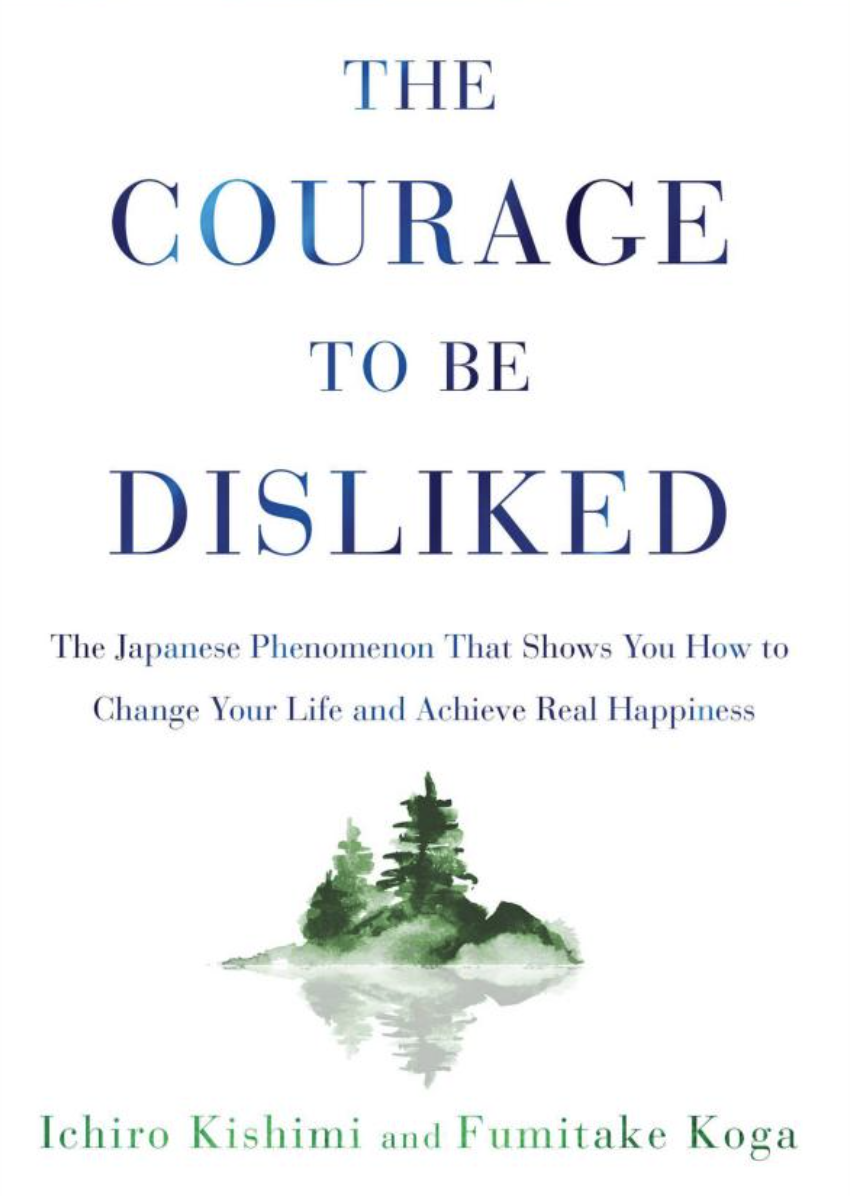
Book Review: 'The Courage To be Disliked'

People always say “listen to your heart”, but often the voice of heart is blurred by the outside noise and cannot be heard clearly. Education and training has been dominant from my early adulthood and in some aspects it even becomes an excuse for me to avoid other family/society responsibilities in life. It was at the time when I had to make the decision on what career path to pursue after graduation that I started to ask myself seriously and repeatedly what I really want from life. Then in a bit of serendipity I was recommended to read the book “The Courage To Be Disliked”. I have read the book three times in the past two months, and I have the sense that it will make a change in my life.
The book is an illustration of Adlerian psychology proposed by the Austrian psychiatrist Alfred Adler, one of the three giants of nineteenth-century psychology alongside Freud and Jung, written by a Japanese writer who was deeply affected by Adlerian psychology and a Japanese philosopher who studies Adlerian psychology. Adlerian psychology is in essence an individual psychology. The book explains how Adlerian psychology can help a person acquire courage to face life responsibilities, manage interpersonal relationships, make changes and be happy from here and now. The book is written in dialogue format based on years of exchanges between the two authors. In addition to the inspiring psychology concepts presented in the book, the underlying rigorous logic is also very fascinating. In this blog I would like to share four points that have made me feel enlightened.
1. All problems are interpersonal relationship problems
This is a concept that runs to the very root of Adlerian psychology. … It is only in social context that a person becomes an individual. … Whatever the worry that may arise, the shadows of other people are always present.
At first glance this may sound arbitrary, but as I read along the book and thought about it, it’s true that every concern in life comes from interpersonal relationships. People are feeling inferior or superior all the time by comparing themselves with others. They worry about how others would look at them and constantly seek recognition from outside. They either consciously or unconsciously interfere with others’ lives with excuses for the sake of others’ well-being. Indeed the shadows of other people are always present.
Adler made three categories of interpersonal relationships and referred to them as “tasks of work”, “tasks of friendship”, and “tasks of love”, all together as “life tasks”, which we have no choice but to confront when living as social beings. No matter how distressful the relationship, we must not avoid dealing with it. Even if in the end we are going to cut it with scissors, first we have to face it. Have you ever thought that the reason you sometimes don’t want to work is perhaps because you don’t want to interact with coworkers? That you find flaws in a person to dislike him/her because you want to avoid an interpersonal relationship with them from the beginning? That you don’t like yourself because you want to escape relationships with others so that you don’t get hurt? We are running away from the interpersonal relationship and life tasks by blaming others and shifting responsibilities. However, we are the ones who decide our life style hence the responsibility should only lie on ourselves.
2. Task separation & Community feeling
The “life tasks” may sound abstract, so Adlerian psychology also teaches how to practice it in life. Solving interpersonal relationship problems starts from task separation and ends on community feeling. The fundamental idea behind task separation is that one must not seek recognition. Seeking recognition is a natural desire and essentially it subjects us to others’ expectations, but the real freedom coming hand in hand with happiness is to be able to resist that natural inclination and live by our own principles. And remember, if you are not living to satisfy other people’s expectations, it follows that other people are not living to satisfy your expectations. We provide assistance as possibly as we can but we don’t intrude on others’ tasks or be intruded. How people think of you is their task and what efforts we want to make in a relationship is our task, we hold the cards to interpersonal relationships. Life becomes simple immediately after task separation.
Interpersonal relations are the source of unhappiness, and the opposite is also true that interpersonal relations are the source of happiness.
As pointed out by Alder, one can have community feeling – a sense of belonging and having worth – once he/she is in happy interpersonal relations. To gain the community feeling, we need to switch from attachment to self to concern for others. Realize that no one is the center of the world but only part of the community. The community can be as small as a household or as large as a country or universe, and we all belong to multiple communities. In spite of the indisputable fact that everyone has worth by his/her very existence, it’s only in the context of community that one really feels that one has worth. Then one can accept oneself just as one is and have the courage to face life tasks. More specifically, three things are needed to attain community feeling, 1) self acceptance: ascertain things one cannot change and focus on things one can change; 2) confidence in others: it is because one enters into deeper relationships by having confidence in others that the joy of one’s interpersonal relations can grow; 3) contribution to others: feel that our existence and behavior are beneficial to the community with no need to sacrifice the self. The contribution does not have to be a visible one, all we need is the subjective sense of making a contribution. These three are linked as a whole in a circular structure.
3. Build horizontal relationships
To better practice task separation and community feeling, Adler proposes that all interpersonal relationships be horizontal relationships – “all humans are equal but not the same”. Economic status, physical ability, mental intelligence or the like have no connection to human worth, we are only different in experience at certain fields. Certainly this does not suggest that we make friends with everyone, what’s important is to be equal in consciousness and to assert what needs to be asserted. Conversely, vertical relationships occur when judgement is passed by a person of ability on a person of no ability through rebuke or praise, a manner of manipulating someone who has less ability than you. Instead of judging or being judged in a vertical relation, take an approach of encouragement and express gratitude to build a horizontal relation, so that people can feel they are making contributions to the community and feel they have worth, which allows them to possess courage to face life tasks.
In some situations we may be self-conscious to speak our opinions because we are worried about being judged or that our ideas may seem to depart from others. The mental preparation that I have come up with after reading the book is that, firstly realize that whether or not other people will make any judgement is their task, not my task. Secondly keep in mind that expressing opinions is a manner of making contributions to the community. Thirdly even though the idea differs from others, it’s simply a discussion on if the idea itself is right or wrong and it has no affect on personal value: we are equal but with different perspectives.
4. If I change, the world will change
Often people feel helpless because the world is not living up to their expectations and things are not under their control. While it’s true that we can never change other people, still “the power of a person is immeasurably great”, which means that the world can be changed only by me and no one else will change it for me. Think of the interaction of forces in physics: the change of one force will inevitably change the other forces regardless of their willingness.
It takes time to gain a true understanding of Adlerian psychology. It is even said that to understand and apply it to actually change one’s way of living, one needs “half the number of years one has lived”. Above all, we need to start, as advised by Adler,
Someone has to start. Other people might not be cooperative, but that is not connected to you. My advice is this: you should start. With no regard to whether others are cooperative or not.
🎍 Remark
It literally has taken me days to finish writing this blog, as I was trying to wrap my head around these novel ideas and make sense of it with my own understanding. And to be honest it’s hard to apply it in real life as I can feel the mental resistance of changing the habitual behaviors and thoughts. Life has different meanings per person and there might be different ways to get there other than following Adlerian psychology. As far as I am concerned, Adlerian psychology has showed me a way to acquire the courage to be disliked and face life tasks, hence to be able to listen to the heart.
My blog cannot exhaust the wisdom shared by the entire book, so I would strongly recommend the book if you are intrigued by Adlerian psychology. I would like to conclude this blog with a quote from the last chapter of the book.
Life is a series moments, so live more earnestly only here and now, and life is always complete.
